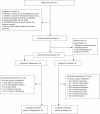Adjunctive risperidone for partially responsive people with schizophrenia treated with clozapine
- PMID: 20664583
- PMCID: PMC2939921
- DOI: 10.1038/npp.2010.101
Adjunctive risperidone for partially responsive people with schizophrenia treated with clozapine
Abstract
The large numbers of partial clozapine responders represent a major therapeutic challenge. Unfortunately, there are no clear data to support how best to treat these patients. This study examines the efficacy and safety of adjunctive risperidone in a well-defined treatment-resistant population optimally treated with clozapine. A total of 69 inpatients and outpatients with DSM-IV schizophrenia or schizoaffective disorder entered a 16-week double-blind, placebo-controlled, randomized clinical trial. Of them, 33 participants were randomized to risperidone and 36 were randomized to placebo. There was no significant group difference in the predefined response criteria. There were modest group differences for Brief Psychiatric Rating Scale (BPRS) positive symptoms, which were significant in the completer analysis (F=5.70; df=1, 70.3; p=0.02; ES=0.27) but not the intent-to-treat (ITT) analyses (F=3.01; df=1, 77.5; p=0.09; ES=0.19). A similar pattern was found for the BPRS total score, with the completer analysis showing a significant improvement in the risperidone group (F=5.21; df=1, 64.9; p=0.03; ES=0.27), whereas the ITT analysis was not significant (F=3.52; df=1, 71.3; p=0.06; ES=0.22). In addition, there was a small, but significant, group difference for negative symptoms, as measured by the SANS total score, which favored the risperidone group (F=5.67; df=1, 78.7; p=0.02; ES=0.24). There were no significant group differences on safety measures, including neuropsychological test and extrapyramidal symptom scores. A significant elevation of prolactin in the risperidone group was observed. The study results suggest that adjunctive risperidone may have a modest benefit for treatment-resistant clozapine patients. The study results are discussed in the context of previous double-blind studies of adjunctive risperidone. (clinicaltrials.gov, trial number: NCT00056498).
Similar articles
-
A double-blind controlled study of adjunctive treatment with risperidone in schizophrenic patients partially responsive to clozapine: efficacy and safety.J Clin Psychiatry. 2005 Jan;66(1):63-72. doi: 10.4088/jcp.v66n0109. J Clin Psychiatry. 2005. PMID: 15669890 Clinical Trial.
-
Clozapine augmented with risperidone in the treatment of schizophrenia: a randomized, double-blind, placebo-controlled trial.Am J Psychiatry. 2005 Jan;162(1):130-6. doi: 10.1176/appi.ajp.162.1.130. Am J Psychiatry. 2005. PMID: 15625211 Clinical Trial.
-
A double-blind comparative study of clozapine and risperidone in the management of severe chronic schizophrenia.Am J Psychiatry. 2001 Aug;158(8):1305-13. doi: 10.1176/appi.ajp.158.8.1305. Am J Psychiatry. 2001. PMID: 11481167 Clinical Trial.
-
[Antipsychotics in bipolar disorders].Encephale. 2004 Sep-Oct;30(5):417-24. doi: 10.1016/s0013-7006(04)95456-5. Encephale. 2004. PMID: 15627046 Review. French.
-
An open, large, 6-month naturalistic study of outcome in schizophrenic outpatients, treated with olanzapine.Hum Psychopharmacol. 2011 Jan;26(1):81-5. doi: 10.1002/hup.1173. Epub 2011 Feb 9. Hum Psychopharmacol. 2011. PMID: 23055416 Review.
Cited by
-
Augmentation Strategies for Partial or Non-responders to Clozapine in Patients with Schizophrenia: A Bayesian Network Meta-analysis of Randomized Controlled Trials.Clin Psychopharmacol Neurosci. 2024 May 31;22(2):232-252. doi: 10.9758/cpn.23.1119. Epub 2023 Nov 30. Clin Psychopharmacol Neurosci. 2024. PMID: 38627071 Free PMC article. Review.
-
Serum galectin-3, but not galectin-1, levels are elevated in schizophrenia: implications for the role of inflammation.Psychopharmacology (Berl). 2017 Oct;234(19):2919-2927. doi: 10.1007/s00213-017-4683-9. Epub 2017 Jul 11. Psychopharmacology (Berl). 2017. PMID: 28698921
-
Combination and high-dose atypical antipsychotic therapy in patients with schizophrenia: systematic review.CADTH Technol Overv. 2012;2(3):e2301. Epub 2012 Sep 1. CADTH Technol Overv. 2012. PMID: 23002379 Free PMC article. No abstract available.
-
Antipsychotic augmentation vs. monotherapy in schizophrenia: systematic review, meta-analysis and meta-regression analysis.World Psychiatry. 2017 Feb;16(1):77-89. doi: 10.1002/wps.20387. World Psychiatry. 2017. PMID: 28127934 Free PMC article.
-
Blonanserin Augmentation of Atypical Antipsychotics in Patients with Schizophrenia-Who Benefits from Blonanserin Augmentation?: An Open-Label, Prospective, Multicenter Study.Psychiatry Investig. 2016 Jul;13(4):458-67. doi: 10.4306/pi.2016.13.4.458. Epub 2016 Jul 25. Psychiatry Investig. 2016. PMID: 27482249 Free PMC article.
References
-
- Anil Yağcioğlu AE, Kivircik Akdede BB, Turget TI, Tümüklü M, Yazici MK, Alptekin K, et al. A double-blind controlled study of adjunctive treatment with risperidone in schizophrenic patients partially responsive to clozapine: efficacy and safety. J Clin Psychopharmacol. 2005;66:63–72. - PubMed
-
- Awad AG. Subjective response to neuroleptics in schizophrenia. Schizophr Bull. 1993;19:609–618. - PubMed
-
- Barnes TRE. A rating scale for drug-induced akathisia. Br J Psychiatry. 1989;154:672–676. - PubMed
-
- Beaulieu JM, Gainetdinov RR, Caron MG. The Akt-GSK-3 signaling cascade in the actions of dopamine. Trends Pharmacol Sci. 2007;28:166–172. - PubMed
-
- Benedict R. Brief Visuospatial Memory Test—Revised. Psychological Assessment Resources: Odessa, FL; 1997.
Publication types
MeSH terms
Substances
Associated data
Grants and funding
LinkOut - more resources
Full Text Sources
Medical
Miscellaneous


